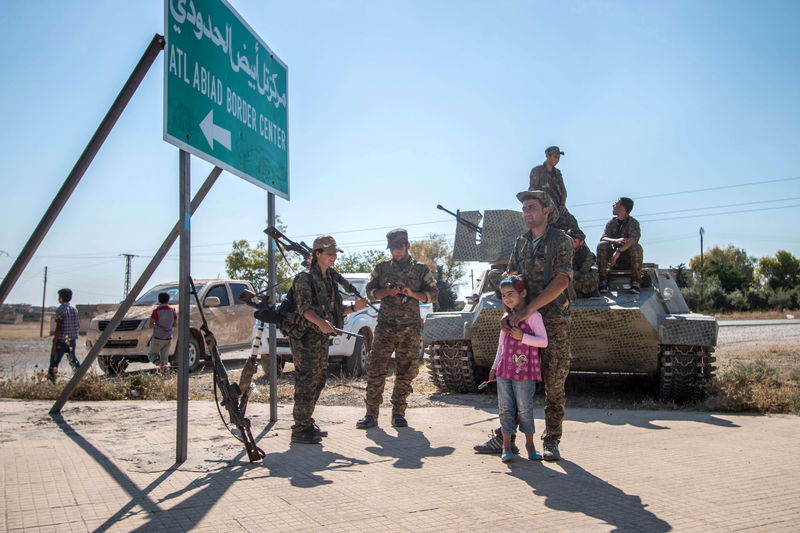By Tom Perry and Laila Bassam
BEIRUT (Reuters) - Kurdish-led forces in Syria seized a town from Islamic State on Tuesday after capturing a military base overnight, aided by U.S.-led air strikes in some of the most dramatic gains yet against the militants.
The Kurdish march deep into the heart of Islamic State territory follows their capture of a town on the Turkish border last week, reversing the momentum of militants who had seized major towns in both Syria and Iraq last month.
The Kurdish YPG-led forces had taken full control of Ain Issa, said YPG spokesman Redur Xelil. The Syrian Observatory for Human Rights, which reports on the war, said Islamic State fighters had completely withdrawn from the town.
Overnight, advancing forces including Syrian rebels fighting alongside the YPG took control of the nearby Liwa-93 military base, a strategic objective which Islamic State had captured last year from government forces.
The advance to Ain Issa brings the Kurdish forces and their allies within 50 km (30 miles) of Raqqa, Islamic State's de facto capital, from which it rules over a "caliphate" across much of Syria and Iraq.
But Xelil said an assault on the city was not currently planned. The Observatory said the aim of the advance was to seize control of an east-west highway running through Ain Issa which links the city of Aleppo with the northeastern province of Hasaka.
The United States and its Arab and Western allies launched an air campaign against Islamic State last year after the fighters, also known as ISIS, ISIL or Daesh, proclaimed their "caliphate" to rule over all Muslims.
The YPG fighters have emerged as the most credible ally of the U.S.-led campaign on the ground in Syria, where Washington has fewer friends than in Iraq. Xelil described the U.S.-led air support as "excellent".
Islamic State spokesman Abu Muhammad al-Adnani urged fighters to escalate attacks during the Muslim holy month of Ramadan and vowed to defeat the U.S.-led campaign against them, promising "surprise after surprise" in coming days.
In a separate battle, the Syrian military and militias fighting alongside it have gained ground to the northwest of the city of Palmyra, which Islamic State captured from government control last month, according to the Observatory and a source in Syria briefed on the situation.
The West and its Arab allies have shunned the idea of partnering President Bashar al-Assad in the fight against Islamic State.
(For map of latest advances click http://link.reuters.com/mek94w )
"STRANGLEHOLD"
The group has shown little resistance to the latest YPG-led advance.
A US intelligence official, speaking on condition of anonymity, said the setbacks were "notable" and showed that the militants "were vulnerable especially to motivated and well equipped forces backed by the coalition".
The Pentagon's said it carried out three air strikes in the area of Tel Abyad, 30 km (20 miles) north of Ain Issa.
The YPG advance gathered pace last week when the Kurds, in partnership with smaller groups under the banner of the Western-backed Free Syrian Army (FSA), captured Tel Abyad and cut an Islamic State supply route from Turkey.
Coordination between the YPG and the U.S.-led alliance has deepened since they first joined forces to defend the town of Kobani, also on the Turkish border, defeating Islamic State fighters in January after four months of battle.
Asked whether the de facto Islamic State capital was now a target, Xelil said: "Raqqa is a Syrian city, like Tel Abyad and Kobani, and all Syrians want it freed of Daesh terror. But at the current time it is not included in our agenda."
Thousands of people have fled the YPG-led advance into Raqqa city in recent days, the Observatory says.
Some people escaping Tel Abyad have accused the Kurds of expelling Arabs and Turkmen, a claim dismissed as propaganda by the YPG. More than 2,000 Syrians who had fled into Turkey crossed back into Syria on Monday.
The Observatory says there have been no systematic YPG abuses, though some have been carried out by individuals.
Government forces had also advanced against Islamic State to the west of Palmyra, home to Roman-era ruins that are listed as a UNESCO World Heritage site, the Observatory said.

Islamic State considers such monuments idolatrous. Its fighters have planted explosives in the ruins, the Observatory reported on Saturday, raising concern the site could meet the same fate as monuments plundered and razed in Iraq.